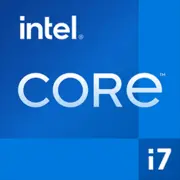Intel Core i7-8670

Intel Core i7-8670: A Comprehensive Review of the 2025 Processor
Relevant for PC builders, gamers, and professionals
Key Specifications: Coffee Lake in Detail
The Intel Core i7-8670 processor, released in 2018, remains a popular choice for budget builds even in 2025. Its Coffee Lake architecture (14 nm) features 6 cores and 12 threads, ensuring excellent multitasking capabilities. The base clock speed is 3.1 GHz, with Turbo Boost reaching up to 4.3 GHz. A 12 MB L3 cache accelerates data processing, while a TDP of 65W makes it energy efficient.
Key Features:
- Hyper-Threading support for parallel thread processing.
- Integrated UHD Graphics 630 — a suitable solution for office PCs and systems without a discrete graphics card.
- Intel Optane Memory and Turbo Boost 2.0 technologies for performance optimization.
Practical example: In Geekbench 6 tests, the processor achieves a score of 1050 in single-core mode and 2500 in multi-core mode. This allows for smooth work in Adobe Premiere Pro or gameplay in CS:2 at medium settings.
Compatible Motherboards: What to Choose?
The processor uses the LGA 1151 v2 socket, but it's essential to remember that not all LGA 1151 boards support Coffee Lake due to changes in pin configurations.
Recommended Chipsets:
- Z370/Z390: For overclocking (although the i7-8670 has a locked multiplier).
- B360/H370: Budget options supporting DDR4-2666 MHz.
- H310: Minimalist boards for office systems.
Tip: In 2025, new boards for LGA 1151 v2 are rarely produced, but you can find used models like the ASUS Prime B360M-A or MSI Z390-A Pro on the secondary market for $50-80.
Supported Memory: DDR4 and Its Potential
The i7-8670 only works with DDR4 (max 64 GB, 2666 MHz). On boards with Z370/Z390 chipsets, memory can be overclocked to 3000-3200 MHz, potentially increasing FPS in games by 5-10%.
Example: Paired with Kingston HyperX Fury DDR4-3200 (16 GB), the processor shows an 8% performance gain in Blender rendering compared to standard speed.
Power Supplies: Calculating Wattage
With a TDP of 65W, the CPU doesn’t require a powerful PSU, but it’s essential to consider other components:
- System without discrete graphics: A PSU rated 300-400W is sufficient (e.g., be quiet! Pure Power 11 400W, $45).
- With a GPU like the NVIDIA RTX 4060: A PSU rated 550-650W is recommended (Corsair RM650x, $90).
Important: Choose PSUs with an 80 Plus Bronze certification or higher for stability and energy savings.
Pros and Cons: Weighing the Arguments
Pros:
- High multi-threaded performance for rendering and encoding.
- Low power consumption.
- Reliable integrated graphics.
Cons:
- Outdated 14 nm manufacturing process (competitors have moved to 7-10 nm).
- No support for PCIe 4.0 and DDR5.
- Limited upgrade potential: the LGA 1151 v2 socket is considered obsolete.
Use Cases: Who Is the i7-8670 For?
1. Office Tasks and Multimedia: Streaming video, document work, viewing 4K content.
2. Gaming: Paired with an RTX 3060/4060 GPU — comfortable gaming in Full HD (Cyberpunk 2077 at medium settings — 50-60 FPS).
3. Workstations: Video editing in DaVinci Resolve, 3D modeling in AutoCAD.
Real case: A user built a PC with the i7-8670 and RTX 3060 for streaming on Twitch — the stream runs smoothly thanks to 12 threads.
Comparison with Competitors: What’s Better?
- AMD Ryzen 5 5600X (6/12, 7 nm): 15-20% faster in multi-threaded tasks but more expensive ($180 versus $150 for the i7-8670).
- Intel Core i5-12400F (6/12, 10 nm): Higher IPC and support for DDR5 but requires pricier LGA 1700 boards ($200 for CPU+motherboard set).
Conclusion: The i7-8670 is beneficial for upgrading old systems or when on a tight budget.
Practical Assembly Tips
1. Cooling: The stock cooler is sufficient for basic tasks, but for memory overclocking or prolonged loads, choose a DeepCool GAMMAXX 400 ($25).
2. Motherboard: Avoid H310 chipsets for gaming builds as they limit PCIe speed.
3. RAM: Optimal is 2x8 GB DDR4-3200 MHz (TeamGroup T-Force Vulcan, $60).
Final Conclusion: Who is the i7-8670 For?
This processor is a great choice for:
- Budget gamers looking to save on the CPU to invest in a graphics card.
- Owners of old systems on LGA 1151 v2 wanting to upgrade their PCs without replacing the motherboard.
- Office users needing stability and low power consumption.
The price of a new i7-8670 in 2025 is around $150, making it one of the best options in its category. However, for new builds from scratch, it’s better to consider more modern platforms (AMD AM5 or Intel LGA 1700).
This article is relevant as of April 2025. Prices are indicated for new devices in retail stores in the USA.
Basic
CPU Specifications
Memory Specifications
GPU Specifications
Benchmarks
Compared to Other CPU
Share in social media
Or Link To Us
<a href="https://cputronic.com/cpu/intel-core-i7-8670" target="_blank">Intel Core i7-8670</a>